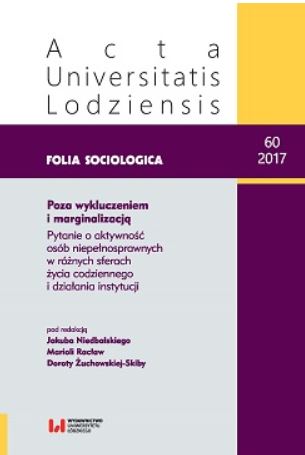Kapitał społeczny osób niepełnosprawnych jako podstawa działań ekspresyjnych i jego wpływ na zdrowie fizyczne, psychiczne oraz zadowolenie z życia
Social capital of people with disabilities as a base for the expressive action and its effects on physical health, mental health and life satisfaction
Author(s): Tomasz MasłykSubject(s): Social Sciences, Sociology, Health and medicine and law
Published by: Wydawnictwo Uniwersytetu Łódzkiego
Keywords: disability;health;social diagnose; social capital;health
Summary/Abstract: The aim of the article was to present the relationship between social capital, taking into account its two forms: bonding and bridging capital, and emotional benefits achieved by people with disabilities as a result of its impact. At the stage of analysis we distinguish three types of benefits: physical health, mental health and life satisfaction. Conceptual framework is based on the guidelines proposed by Nan Lin in his structural theory of social capital. The empirical analysis is based on data from studies of the Social Diagnosis 2015. The main conclusion according to the results of the analysis was that social capital in an independent manner, during control of the influence of sociodemographic variables and the degree of disability, affects the quality of life of people with disabilities. In the case of physical health it was observed its negative impact, but in relation to mental health and life satisfaction the impact was positive.
Journal: Acta Universitatis Lodziensis. Folia Sociologica
- Issue Year: 2017
- Issue No: 60
- Page Range: 161-181
- Page Count: 21
- Language: Polish

